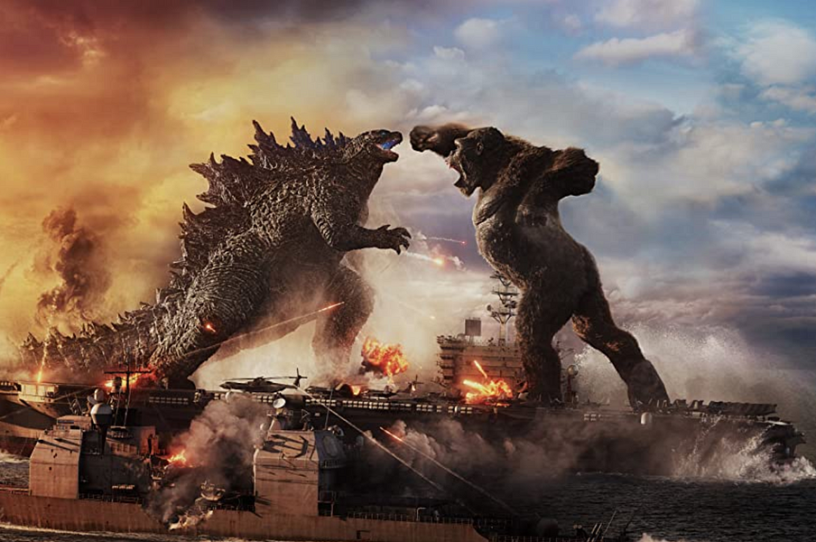A Giant Disappointment

The point of a film review isn’t just to rehash the plot or critique the acting, but to examine its themes, the ideas it explores, the questions it asks. The recently released Godzilla vs. Kong asks a question I’ve never seen a movie ask before: “What would it look like if a really big monkey fought a giant lizard with fire breath?”
Answer: really freakin’ awesome.
Unfortunately, Godzilla vs. Kong is so preoccupied with this question it doesn’t really bother with anything else, leaving viewers with some impressive spectacle as the two behemoths fight tooth and nail and magic axe—yeah, you read that right—through the Pacific Ocean and Hong Kong, but little else. This is a movie that wants to show big ol’ monsters fighting each other, and it doesn’t care what it has to do to make that happen. It’s a mystery why director Adam Wingard brought together an impressive cast—Alexander Skarsgård, Millie Bobby Brown, Eiza González, Lance Reddick, and Kyle Chandler—but gives the actors so little to work with in terms of character development and dialogue. They barely matter to the story.
The storylines involving the human protagonists are tedious, with Skarsgård playing Dr. Nathan Lind, a geologist who is pulled into a mission with King Kong to find the monsters’ place of origin, a magic land in the center of the earth with a power source unlike anything that exists on the surface. Joining him are Dr. Ilene Andrews (Rebecca Hall), the Jane Goodall of King Kong; Andrews’ adopted daughter Jia (Kaylee Hottle), a very young deaf girl who is inexplicably brought on the extremely dangerous mission; and Maia Simmons (González), a representative of Apex—the company bankrolling the mission—who is criminally underutilized, turned into a two-dimensional villain with very few lines.
In the Godzilla side of the plot we follow Madison Russell (Brown) as she and fellow precocious-teen-intended-for-lazy-comedic-effect Josh Valentine (Julian Dennison) team up with conspiracy theory podcaster Bernie Hayes (Brian Tyree Henry) to prove that Godzilla isn’t bad, but in fact Apex has caused him to attack humans because he can sense that they’re building a weapon to try to protect against his attacks. None of this story follows any semblance of real world logic, as the trio traipses around top secret facilities without any apparent security systems and luck into every single bit of evidence they need as they attempt to vindicate Godzilla.
Both of these storylines are ridiculous, clearly forced in because the filmmakers weren’t content to let monsters just be monsters: These are properties! With monetary value! Thus, the logic apparently goes, they must also be good guys so audiences will continue to tune in. We’re told over and over again that Godzilla doesn’t attack unprovoked—humanity was asking for it by developing a weapon to protect itself against monsters, apparently. And King Kong is given a sympathetic backstory and begins to communicate via sign language with Jia, who lets us know that Kong isn’t violent, just misunderstood.
And yet, Kong and Godzilla kill thousands, if not millions of people as they attempt to hash out some ancient rivalry between their ancestors, making it entirely understandable why the nominal bad guy Generic Military Corporation Villain, oops I mean Apex CEO Walter Simmons (Demián Bichir), wants to create a weapon to protect humanity. That weapon, a giant robot version of Godzilla, is an absurd third act contrivance that attempts to salvage Kong and Godzilla’s reputation as good guys by giving them the chance to team up to fight the out-of-control robot and “save” the city of Hong Kong—or however much of it is left given they’d just finished rampaging through it themselves. It is the ultimate deus ex machina—or should I say, ahem, deus ex mechagodzilla—allowing the protagonists to fight and destroy like audiences want to see, while still letting them end the movie as essentially heroes. It’s dumb.
So if you want to see some cool fight scenes of big monsters fighting each other, boy do I have the 15 minutes or so of movie for you. But a nearly two-hour movie needs to deliver a lot more than just 15 minutes of impressive visuals to justify its existence. And Godzilla vs. Kong doesn’t.